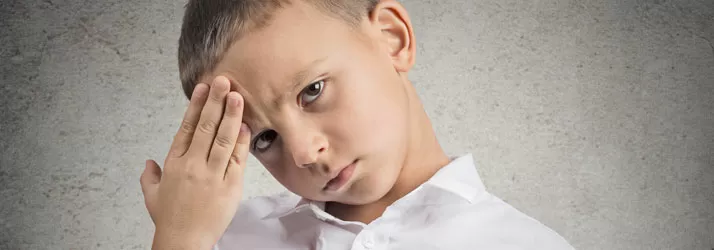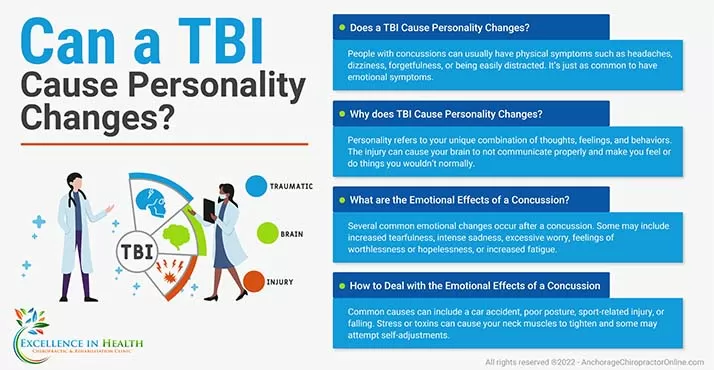What Are the Personality Changes Associated With TBI?
Emotional Effects of a Concussion: Can a TBI Cause Personality Changes?

A traumatic brain injury (TBI) usually results from a violent blow or jolt to the head or body. Concussions may occur after a fall, car accident, sports-related injury, or other physically traumatic event.
People with concussions usually have physical symptoms, such as headaches, dizziness, forgetfulness, being easily distracted, or other cognitive symptoms. However, it is just as common to have emotional symptoms that interfere with recovery.
You may experience personality changes after a concussion. If you recently suffered head trauma and notice a change in mood or personality, it's essential that you seek professional guidance to identify the cause of the shift and seek treatment. At Excellence in Health Chiropractic in Anchorage, our caring team can quickly get you into our office for an evaluation to help identify if you may have experienced a concussion and what the best route for treatment is.
In this blog, we'll discuss how a concussion can cause certain personality changes and how to best care for yourself as you seek help.
Do you suspect that you have a concussion? Contact Excellence in Health to find out.
Why Does TBI Cause Personality Changes?
Personality refers to your unique combination of thoughts, feelings, and behaviors. After a TBI, you may notice changes in your emotions or behaviors for a short period. However, as much as 30% of concussion patients experience long-lasting symptoms of altered or inefficient information processing and experience what is referred to as Post-Concussion Syndrome.
The location of a brain injury can have an impact on how your behavior changes:
- Cerebral Cortex: Section of the brain that is responsible for roles such as memory, attention, perception, cognition, and awareness. When injured, you may notice brain fog or issues with remembering events.
- Orbitofrontal Cortex: Area of the brain responsible for controlling impulse behavior and empathy. If injured, it can cause you to engage in reckless behavior or struggle to empathize with someone.
- Limbic System: Part of the brain that is responsible for systems that control emotions, behavior, and motivation. The connections between the cerebral cortex and limbic system help you evaluate your emotional reactions, understand the importance of events, and decide on an appropriate response to a situation. When the connection is injured, it can cause you to react differently emotionally and not correctly sync with the current situation.
- Hippocampus: Part of your brain known for converting short-term memories into long-term memories, which can also be affected by a concussion.
There are several ways that your brain can be momentarily injured and cause a shift in behavior and mood. It's normal to feel frustrated and out of control when struggling with an injury that causes a change in behavior and attitude, but with the right treatment, your symptoms can return to "normal."

What are the Emotional Effects of a Concussion?
Several common emotional changes occur after a concussion. Some may include:
- increased tearfulness
- intense sadness
- excessive worry
- feelings of worthlessness
- hopelessness
- increased fatigue
You may also experience a change in your social interaction. This can include withdrawing from social activities, such as no longer playing sports, losing interest in activities you used to enjoy, and not going out with friends. It's also common to isolate yourself from your friends and family.
Your sleeping habits may also be altered. It may take longer for you to fall asleep, or you may wake up more frequently and have difficulty falling back asleep. You may also notice a change in appetite that can cause you to eat more or less than usual.
The most common emotional side effects include depression, anger, irritability, and anxiety.
Depression
Depression is common among people suffering from a TBI and may increase the risk of self-harm, depressive symptoms, attempted suicide, and injury from attempted suicide. A study showed that the suicide rate for individuals with a brain injury is twice as high as those without a brain injury.
Anger and Irritability
Feeling irritable or impatient is a common side effect for people with concussions. Pervious interactions or situations that didn't bother you before may cause an outlash after a TBI. Your brain is trying to handle more than usual, which can cause minor everyday inconveniences to feel like emergencies.
Overstimulation can cause irritation, angry outbursts, and mood swings. Some people may also feel anger if the recovery period takes longer than expected. Try to remain patient with yourself, let yourself get adequate rest, and keep yourself from being overstimulated.
Anxiety
After a TBI, you may find yourself worrying about things you didn't previously, or the feelings of worry may have worsened. You may feel on edge, which can cause you to have difficulties sleeping and constantly think about what could go wrong.
Are you suddenly feeling depressed, angry, or anxious after an injury? Contact Excellence in Health to help with concussion recovery.
How to Deal with the Emotional Effects of a Concussion
During the recovery process, a few things can help deal with the emotional effects of the concussion and aid in the recovery.
Consider Underlying Factors
Note any pre-existing developmental or psychological factors like underlying learning, attention, or emotional difficulties.
Identify and Manage Your Triggers
It's also beneficial to recognize any triggers that cause your mood swings or angry outbursts. If you're feeling overwhelmed or overstimulated, it would be a good idea to take note of what caused that and stay away from that type of situation during recovery. Setting up a daily routine can also help with not overstimulating your brain.
Enlist Some Help During Recovery
It can be beneficial to get help from a family member or friend to help monitor your overstimulation. They could pick up on cues that you're missing. You may also want to talk to them about any of the emotions you're facing and having difficulty with so they can help you.
Carve Out Time for Adequate Sleep
Although it may be challenging to get consistent and quality sleep, your brain must have these downtimes to reduce stress, improve mood, and return to the typical functioning. Sleep deprivation isn't good for anyone, but it can lead to more severe mood symptoms and increase cognitive and physical symptoms.
Do Some Light Exercise
Exercising can also be an essential part of recovering. Although it could be difficult to exercise, doing it safely can help relieve stress and tension. It will also provide your brain with a biochemical boost to make you feel better and help handle the day's needs.
How to Get Help for the Emotional Effects and Recovery
Excellence in Health Chiropractic & Rehab Clinic participates in the Complete Concussion Management Inc. (CCMI) Partnership Program is a network of clinics worldwide that offers evidence-based concussion care. CCMI thoroughly examines the existing and emerging research on concussions and utilizes the research to create extensive training on treating concussion injuries.
CCMI treatment includes balance rehab, nutritional intervention, vision rehab, cognitive testing, integrated manual therapy, exercise rehab, returning to school, work, and sport, and pre-season testing.
With CCMI, we offer concussion treatment services and strategies to Alaskans, including:
- Exertional testing for sub-symptom threshold programs for persistent symptoms as well as confident return-to-sport readiness
- Dietary and Nutritional Interventions
- Vestibular, Oculomotor, and Cervical Spine Rehabilitation
- Balance, Reaction Time, Visual Processing, and Neurocognitive Testing including pre-season baseline tests as well as post-injury testing
- Educational Resources
- Neurocognitive rehabilitation
- Occupational therapy
- Objective Electroencephalography/event-related potential (EEG/ERP) testing with Neurologist interpretation for complex cases
During the early stages of a concussion injury, between 24 to 48 hours, limiting physical and cognitive activity is helpful. It's recommended to gradually increase mental and physical activity while supervised by a licensed healthcare practitioner trained in concussion management. Excellence in Health Chiropractic and Rehabilitation Clinic is ready to work with you to find out what is causing your persistent symptoms and get you back to living your best life.
Ready to get help through your concussion recovery? Contact Excellence in Health to get started.

Monday
8:30am - 6:30pm
Tuesday
8:30am - 6:30pm
Wednesday
8:30am - 6:30pm
Thursday
8:30am - 6:30pm
Friday
8:30am - 6:30pm
Saturday
9:00am - 5:00pm
Sunday
Closed
Monday
9:00am - 7:00pm
Tuesday
9:00am - 7:00pm
Wednesday
9:00am - 7:00pm
Thursday
9:00am - 7:00pm
Friday
9:00am - 7:00pm
Saturday
9:00am - 5:00pm
Sunday
Closed
Excellence In Health Chiropractic & Rehabilitation Clinic
2008 E Northern Lights Blvd #100
Anchorage, AK 99508

